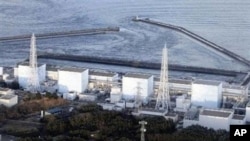Public health experts say quick and timely action prevented the tsunami-struck Fukushima nuclear power plant in Japan from turning into a major disaster. The experts presented an overview of radiation risks and public health concerns arising from this event at a special meeting at the World Health Assembly.
Director of Public Health and Environment at the World Health Organization (WHO), Maria Neira, says the decision by the Japanese authorities to evacuate people living outside a 20-kilometer radius of the stricken Fukushima Dalichi power plant prevented a catastrophic impact on public health.
“That was a decision taken in the first 24 hours, which is exactly when you need to take it and from that day we were avoiding the worst scenario," said Neira. "So, that was a very important decision and the one that is protecting the human health from those that had been evacuated.”
The earthquake and tsunami that struck Japan’s northeast coast on March 11 killed more than 25,000 people, destroyed or damaged some 60,000 houses, and left 110,000 homeless. This event also struck the nearby nuclear facilities, resulting in a meltdown and potentially dangerous release of radiation into the atmosphere.
Makoto Akashi is Executive Director at the National Institute of Radiological Sciences in Japan. He says the amount of radioactive cesium released into the atmosphere is much smaller than that released in the nuclear accident in Chernobyl.
But, no one knew this at the time, so he says screening of people for radiation began one day after the earthquake on March 12.
“We provided radiation monitoring for many, many people," Akashi noted. "But, no treatment was provided because level of contamination for the workers and also public people not so high…Fortunately, there are no workers or public people requiring treatment for radiation exposure or contamination with radionuclide. And, monitoring system has been established for tap water and food. So, there is no dangerous food or tap water in Japan.”
The experts agree no major public health impact is expected from the release of radiation from the Fukushima plants. They say there is no immediate risk of people getting cancer. Nevertheless, they say it is prudent to remain vigilant and they plan to maintain a system to monitor the people and the environment involved in this nuclear disaster in the years to come.
Quick Action Prevented Serious Impact From Fukushima Accident












